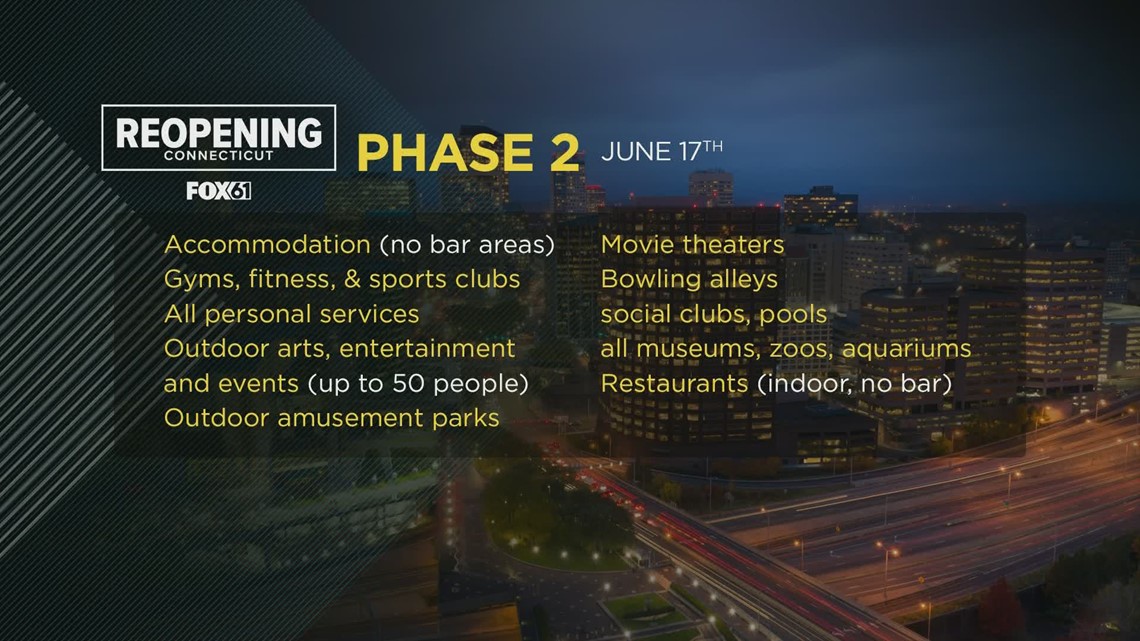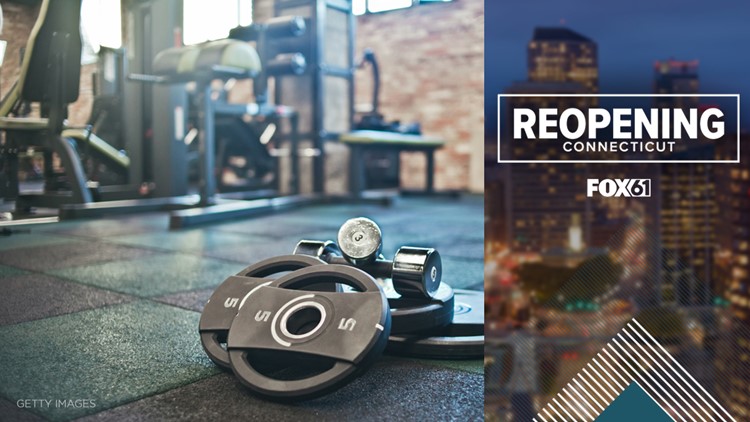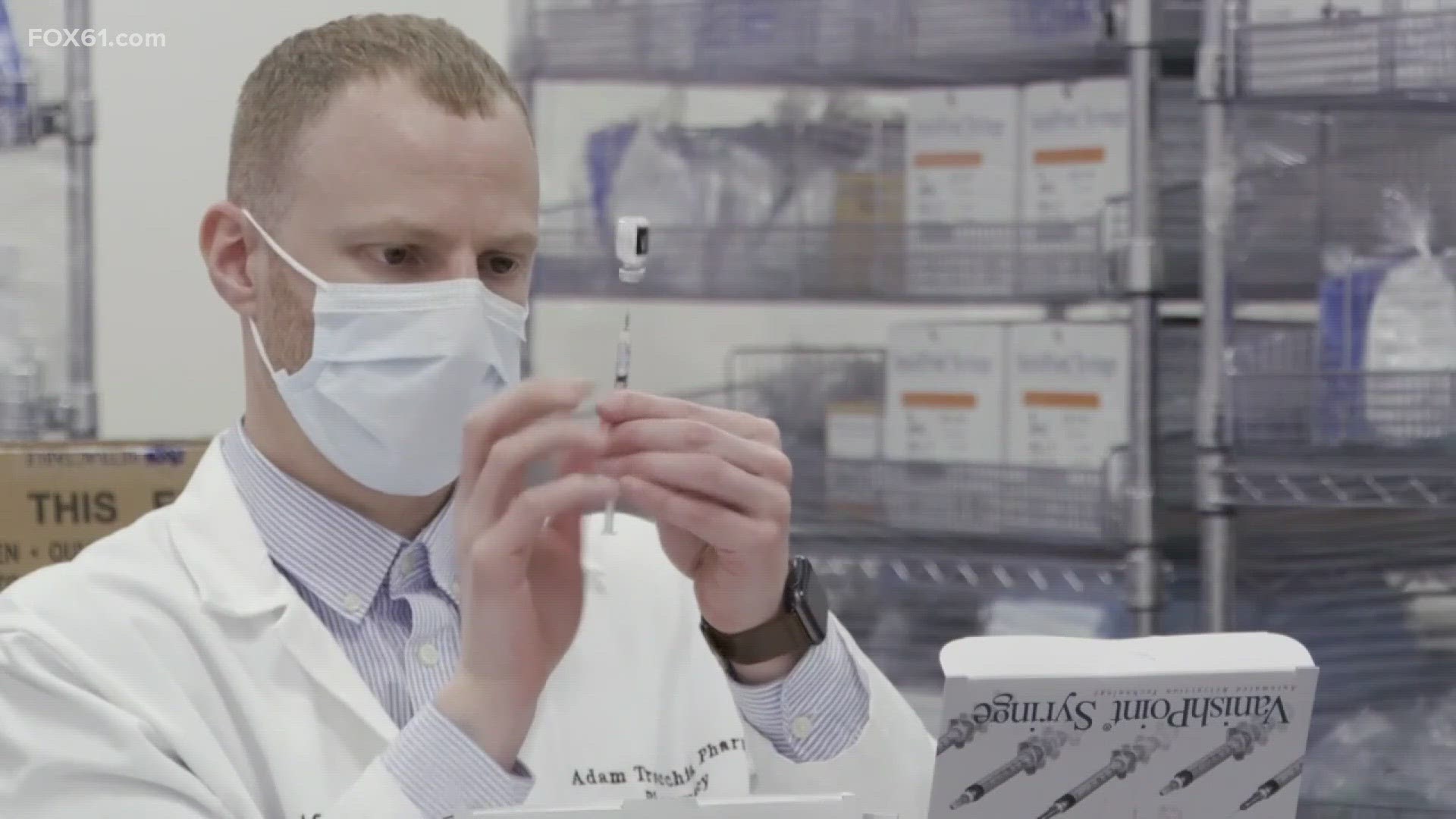HARTFORD, Conn — As coronavirus hospitalizations in Connecticut maintained their downward trend after the May 20 reopening, the state is now preparing for phase two. Wednesday, June 17 is the official launch date for next steps in the state's reopening plan.
The original date for phase two was June 20, but Governor Lamont moved it up a couple days to avoid reopening during the busy Father's Day weekend.
Here is what will be allowed to reopen in phase two:
- Amusement Parks (up to 25% capacity)
- Hotels / Lodging
- Restaurants (indoor, no bar -- current table limit is 25)
- Museums, zoos, and aquariums
- Indoor recreation (e.g., bowling alleys, movie theaters, etc.)
- Libraries
- Outdoor arts, entertainment and events (up to 50 people)
- Personal services (e.g., nail salons, tattoo parlors, etc.)
- Sports and fitness facilities (e.g., gyms, fitness centers, pools, etc.)


The following are among a host of new measures implemented by the state for all reopening businesses to ensure safety of Connecticut residents.
- Capacity limit of 50% for most businesses that reopen.
- Strict cleaning and disinfection protocols in all settings.
- Those who can work from home should continue to do so.
- Those in high-risk groups (comorbidities) and over the age of 65 should continue to stay safe and stay home.
- Facemasks should continue to be worn in public at all times.
- Social gatherings will be restricted in accordance to the Governor's executive order.
State officials say safeguards will be loosened gradually progress is seen on a defined set of public health metrics.
Those metrics are forthcoming.
Amusement Parks
Outdoor amusement parks can open at up to 25% capacity.
What can guests expect?
- Parking staff must direct customers to park in every other spot to ensure social distancing during peak parking hours
- Calculate maximum number of people allowed under the rules for each exhibition room/ride.
- Attendants to remain at same workstation through day to minimize movement.
- Attendants to enforce maximum occupancy per exhibition room/area where possible.
- Increased signage during walk in to educate customers.
- Ride queues (such as “maze-style” queues typical at amusement parks) will be rearranged to prevent patrons waiting in line from having to pass others face-to-face within 6 ft where possible.
- Require online ticket purchase to the greatest extent possible.
- Develop specific loading and social distancing procedures for each ride and attraction, including but not limited to: Leaving empty rows, Seats, Separating guests to maintain safe distances
- Disable or mark every other or every third locker in locker rooms for non-use to enforce 6 ft social distancing requirement
- All self-serve stations and reusable/refillable cup programs must be disabled until further notice
- Water fountain use shall be restricted to water bottle filling stations only
- Install touchless appliances wherever possible
Parks are required to post clear signage that includes the state hotline (211) for employees and customers to report potential violations of these rules.
Head to these websites to learn more about local amusement parks:
Hotels/Lodging
Hotels/Lodging will open to guests with reservations.
What can guests expect?
- Shipping and deliveries shall be completed in designated areas.
- Concierge services shall be provided by phone only
- Guest to be given the choice to have rooms cleaned daily, upon check-out, or some other interval
- Room service deliveries shall be bagged and left at door, knock/ring to notify guest. It is recommended that room service should be provided with disposable dishes and cutlery
- Room service cart should be cleaned before and after every use
- Employees prohibited from entering guest rooms while guest is present (e.g., no in-room bellhop delivery)
- Recommended Passive Decontamination of 24 hours after a guest has checked out
- Discontinued non-essential services such as valet and coat-check
- Removed amenities non-essential to businesses' main function (e.g.: water, coffee, mini bars, and ice machines; in-room items such as writing pads, pens, pamphlets, and ornaments; irons, ironing boards, and hair dryers are allowed as long as they are thoroughly cleaned)
Hotels will encourage social distancing while using elevators.
Guests will be asked for elevators be shared by family groups only, where possible, using signage displaying healthy elevator use protocols including passenger limits and safe distances in the carriage, using elevator attendants to manage flow and discourage over-crowding and encouraging alternatives, such as stairs, where possible.
For more on hotel and lodging guidelines, click here.
Restaurants
During phase two, restaurants are permitted to welcome patrons back in for indoor dining. However, the current table limit is 25 people and bars are still not allowed.
What can customers expect?
- Indoor waiting areas will be closed
- Visual markers to encourage 6 ft social distancing
- Buffet and self-serve stations eliminated
- Amenities non-essential to businesse’s main function (e.g. dance floor, pool table) closed or removed
- Employees to not share equipment. If shared, clean after each use
- Servers should serve specific zones in the restaurant to minimize overlap, where possible
- Businesses are strongly encouraged to use no-touch or disposable options for menus (e.g. phone app, whiteboard). If no-touch or disposable options are not utilized, businesses must sanitize menus between uses
- Use single use packets or containers
- Utensils should be rolled or packaged
- Install touchless appliances wherever possible, including: contactless payments, paper towel dispensers, soap dispensers, trash cans
Restaurants will be required to post clear signage that includes the state hotline, 211, for employees and customers to report potential violations of the rules.
For more on indoor dinging guidelines, click here.
Museums, zoos, and aquariums
Museums, zoos, and aquariums may open outdoor and indoor exhibits at 50% capacity in the current phase of reopening.
What can customers expect?
- Clear signage that reinforces new policies
- Hand sanitizer shall be made available at entrance points and common areas, where possible
- Social distancing while using elevators
- Customers are required to bring and wear masks or cloth face coverings that completely cover the nose and mouth unless doing so would be contrary to his/her/their health or safety due to a medical condition
- Cash and paper receipt transactions limited
- "Touchless” payment options, online ticket sales are recommended
- Timed tickets and/or reservations for entry into the facility, and ensure visitors understand the timed limits of their visit
- Loitering in welcome areas and lobbies discouraged
- Close or remove amenities non-essential to businesses’ main function (e.g. self-serve brochures, gallery guides, or activities)
- Only interactive exhibits/experiences/activities that may be subject to a thorough, routinely scheduled cleaning may be open
- Performances are permitted outdoors only. Performers are exempt from wearing a mask when they are performing and are at least 12 ft away from the nearest person (including other performers)
- No more than 10 people on tours including guide(s)
Museums, zoos, and aquariums will be required to post clear signage that includes the state hotline, 211, for employees and customers to report potential violations of the rules.
For more on museum, zoo, and aquarium guidelines, click here.
Learn more about certain destinations here:
Bowling alleys, movie theaters, etc.
Indoor recreation businesses may open at up to 50% capacity; however, businesses should limit customers to the number of customers that can be appropriately supervised by staff to ensure continuous compliance with rules for mask wearing, social distancing, and cleaning/disinfecting of equipment and common areas.
What can customers expect?
- Visual social distancing markers to encourage customers to remain 6 ft apart (e.g. lines to get movie theater tickets)
- Indoor waiting areas closed
- Partitions between employees, or between employees and customers where a 6 ft distance cannot be maintained, where possible (e.g. check-in counters)
- Amenities non-essential to business's main function closed or removed
- Touchless appliances wherever possible (e.g. contactless payments, paper towel dispensers, soap dispensers, trash cans)
Indoor recreation facilities will be required to post clear signage that includes the state hotline, 211, for employees and customers to report potential violations of the rules.
For more on indoor recreation guidelines, click here.
Libraries
Libraries can open at up to 50% capacity in the current phase of reopening.
What can guests expect?
- Physical barriers around the circulation desk
- Fines and due dates possibly waived and extended to discourage patrons from coming into the library in-person
- In-person services offered, such as the reference desk possibly limited. Patrons will be encouraged to send questions by email and phone to be answered by librarians remotely
- Virtual library programs virtually
- All in-person programs, such as workshops or job fairs, must follow the prevailing limitation on size of social gatherings. Desks and chairs must be arranged so that 6 ft social distancing is observed at all times during workshops
- Patrons encouraged to use book drops to return books instead of returning in-person at circulation desks
- Books returned to the library will be quarantined for at least 48 hours (or intervals based on research approved by the CDC and IMLS)
- Signage directing traffic patterns, limiting the number of patrons allowed in stack areas, or providing access to materials by staff retrieval
- Every other computer terminal or every third blocked off to ensure 6 ft of social distancing
- Amenities non-essential to businesses' main function, including: toys, interactive play areas, shared food/drink stations closed or removed
Disinfectant wipes will be provided at compute stations and seating areas. Patrons will be asked to wipe down keyboards and desks after each use.
For more on library guidelines, click here.
Outdoor Events
Except as otherwise prohibited, outdoor gatherings are permitted provided that any such large outdoor public gatherings shall comply with Phase 2 rules and all other applicable executive orders governing conduct in public places.
The maximum permitted gathering size will be updated by executive order periodically in response to current public health data.
What can attendees expect?
- Attendees shall remain 6 ft apart, excluding immediate family members, caretakers, and household members except when eating
- All event attendees including employees, volunteers and officials shall wear a surgical style mask or other face covering (e.g. cloth mask) that completely covers the nose and mouth
- Contactless &/or digital ticketing where possible
- Bathrooms to be cleaned and disinfected frequently, cleaning log for tracking implemented
- All food service shall adhere to the Sector Rules for Restaurants
- Hand sanitizer provided at entrance points and common areas, where possible
- Sports activities shall adhere to industry rules governing youth sports, gyms, and fitness, etc. depending on relevance
- Professional sporting event organizers should contact DECD for approval of event plans and protocols
Outdoor event operations will be required to develop detailed isolation plans in case any attendee becomes ill with symptoms consistent with COVID-19 during the event. The plan should include a designated isolation area and align to local municipality COVID-19 health protocols.
For more on outdoor event guidelines, click here.
Personal services (nail salons, tattoo parlors, etc.)
Personal Services will open at up to 50% capacity by appointment only, with waiting rooms closed.
Industries include Day Spa, Electrology, Estheticians, Floating, Piercing, Spa, Tanning, Tattoo, Waxing, Massage Therapy, Nail Technicians, & Eyelash Technicians.
What can customers expect?
- Appointments must be pre-scheduled to ensure there is no overlap between customers; stagger scheduling to ensure multiple clients are not arriving and departing at the same time
- Appointments shall be 1∶1 only
- Alternate treatment rooms so that no two patients are treated in the same physical space consecutively. If this cannot be done, ensure enough time in-between clients to properly clean and disinfect
- Work space rearranged to maintain 6 ft of distance between customers and limit movement of employees within facility
- Employees should not share equipment to the extent possible. If shared, clean after each use
- Front desks should be outfitted with Plexiglas or other similar type of barrier
- Amenities non-essential to businesses' main function closed or removed, including: magazines, pamphlets, other waiting room materials, customer-facing water and coffee machines, coat rooms
- Waiting rooms, lobbies, relaxation lounges, etc. must be closed
- Individuals handling laundry shall wear a mask, gloves, faceshield, and protective cover over clothes.
- Each towel, robe, and linen used to cover or protect customers must be used only once
- Plastic or nylon capes and aprons may be washed in a machine and dried on any setting in a dryer or may be disinfected with a spray disinfectant
- Store used or soiled towels, linens, and capes in closed containers labeled "used"
- Towels and other laundered items must be properly cleaned and stored. A commercial linen service shall be used if not done on the premises
More on personal services:
- Hot tubs Limit -- 50% occupancy and 6 ft distancing
- Hydrotherapy tubs -- Limit 50% occupancy and 6 ft distancing
- Salt cave -- Limit 50% occupancy and 6 ft distancing
- Salt bath -- Limit 50% occupancy and 6 ft distancing
- Saunas/infrared saunas -- Must remain closed
- Steam rooms -- Must remain closed
Services that require a customer to remove a mask are not allowed to be performed under Phase 2.
For more on personal service guidelines, click here.
Sports and fitness facilities
Sports, sport clubs and complexes, gyms, fitness centers, and pools can open in Phase 2.
Each outdoor sporting event field will be limited to two teams, officials, and limited family members. Indoor sporting events will be limited to 50% of building capacity or 25 people (which ever is smaller) per field, court, pool, rink, etc.
For indoor sporting events, capacity limits can be exceeded but only to include one parent/guardian per athlete. Sports that are allowed to be played include all age ranges.
What can visitors expect?
- Common areas, break rooms, check-in counters (unless touchless), where customers or employees may congregate temporarily closed
- Length of activities limited to avoid unnecessary exposure, decrease congestion, and allow for additional sanitization
- Equipment layout adjusted and access to equipment closed or restricted to maintain at least 6 ft of distance between equipment
- Employees shall clean all equipment frequently, and customers must wipe down equipment after each use. This includes free weights
- Establish and clearly mark “workout zones” for use of dumbbells and free weights
- Free weight exercises that require a spotter cannot be conducted while honoring social distancing norms. Safety measures in all forms must be strictly enforced in the weight room
- Amenities non-essential to businesses' main function (e.g., babysitting, arcades) closed or removed
- Shared machinery and equipment shall be thoroughly cleaned after every use
- Front desks should be outfitted with Plexiglas or other similar type of barrier
- Disable or mark every other or every third locker for non-use to enforce 6 ft social distancing requirement.
- Athletes, coaches, and customers shall be required to bring their own water bottles
- Water fountain use shall be restricted to water bottle filling stations only
- Congregating at water bottle filling stations shall be limited
- Concessions allowed to open but must follow Sector Rules for Restaurants
For more on sports and fitness facility guidelines, click here.



